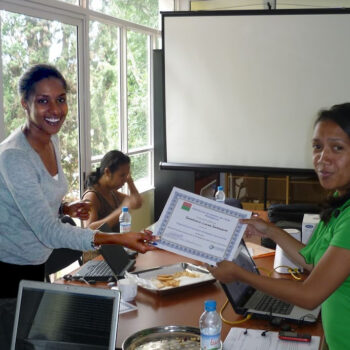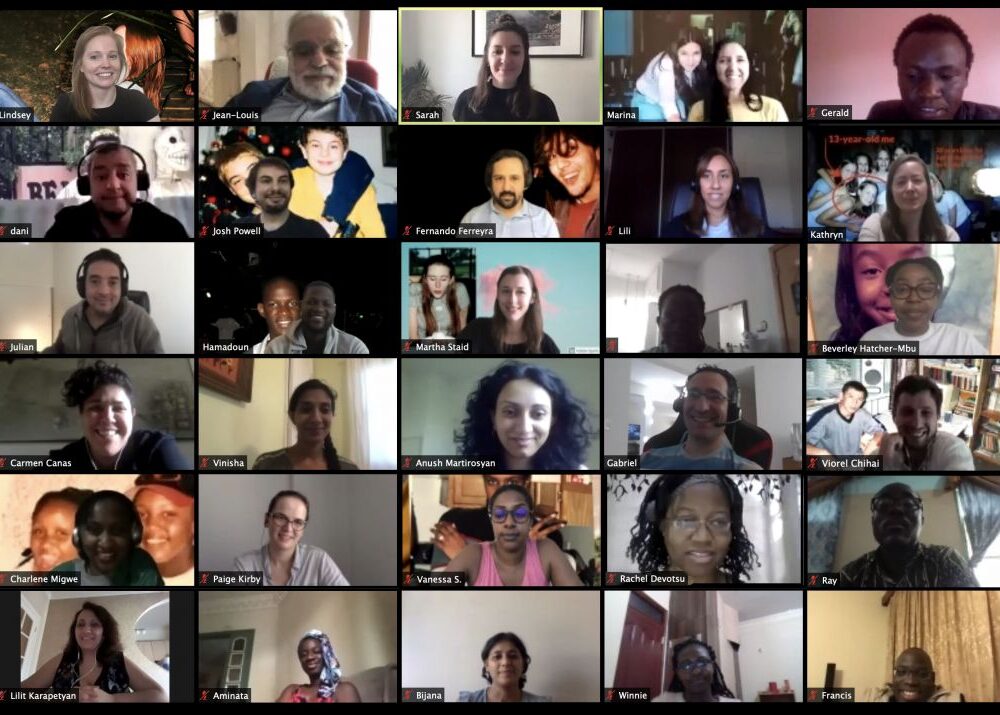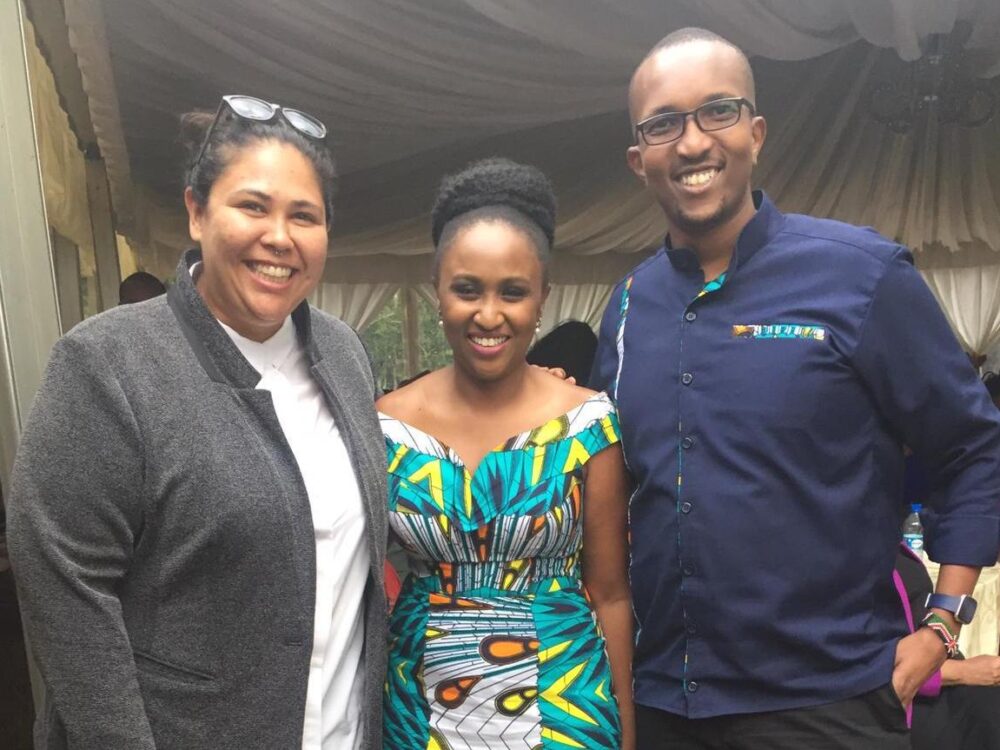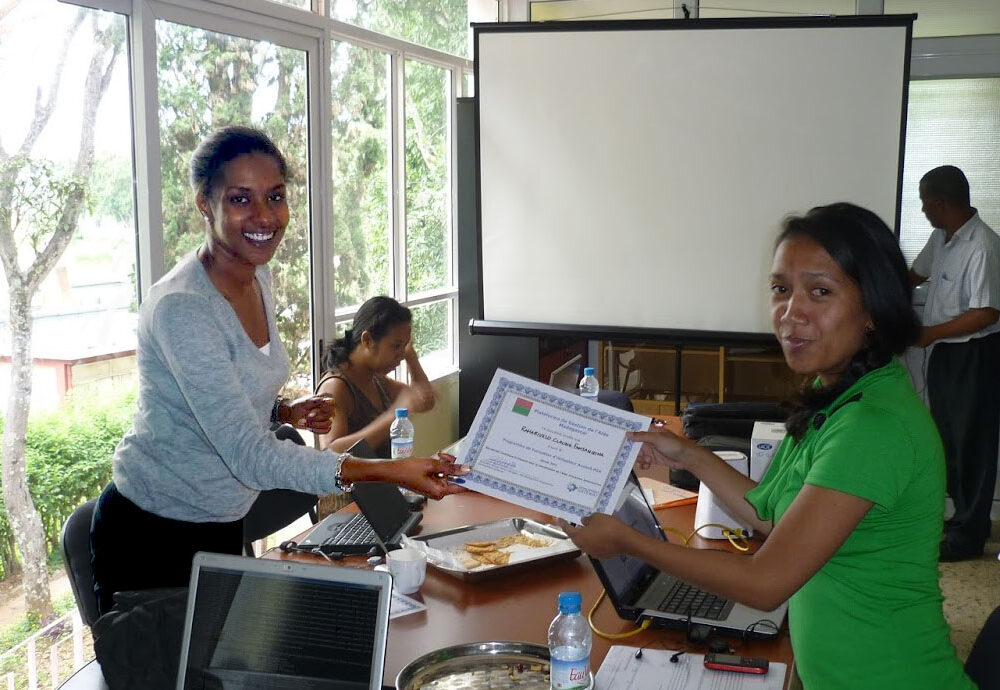20 Years of Lessons Learned
Vanessa Baudin Sanchez is DG’s Regional Project Manager for West Africa, based in Senegal. Vanessa started with DG in 2008 as a technical analyst. Through her time at DG, Vanessa has been an important link connecting lessons learned through project implementation and application for our work. Here she highlights some of the most important lessons DG has learned through the programs she has implemented, and how they shaped the organization we are now.
Cliquez ici pour lire cet article en français.
Learning Shapes Our Work

My first task at DG was to assess and redesign our partner’s network in Burundi to provide AMP users with a comfortable Internet connection. I remember this day like it was yesterday – our early AMP implementations, the glitches, the bugs, and the Java exceptions we faced while in-country and right in the middle of our presentations! Since then, AMP implementations have significantly improved. And as additional modules and functionalities were developed based on partner feedback, the system almost perfectly matches their needs. In addition to developing tools based on both our agile processes and existing partner operational processes, we have also responded to the low bandwidth challenges in the majority of our partner countries by offering an offline version. As we improved AMP usability over the years, we also improved our methodology and approach to streamline its in-country implementation, reducing costs, and favoring a participatory approach throughout the project cycle.
The AMP was our leading system at the time I joined DG. The lessons we’ve learned from developing new features to better support our partners have helped us rethink our approach and expand our work to sectors outside of aid management. We asked ourselves, “what other sectors could also benefit from more data disclosure and use?” When we begin a new project or shift focus to a new sector, we start with an in-country assessment (my favorite stage!). The assessments in which I have participated have been – and continue to be – the best learning experiences for the project team. During this time, we meet all stakeholders. Very often, our partner countries have already started taking action towards improving their data collection and disclosure, so we ask, “how can we help you?” – recognizing their work, jointly assessing their current challenges and building on those findings, sharing lessons learned, examples, best practices, and recommendations that will be tailored to their particular context.
We ask our partners to evaluate us so we can do better next time. I feel that while we remain true to our mission and our core values, our methodologies keep improving mainly because of the constructive feedback we receive both internally and externally. This allows us to deliver, 20 years on, tools that help our clients meet their strategic objectives.
When DG launched the WIM Index, participants shared feedback that would impact our methodology if we were to replicate this exercise in the future: when trying to assess feedback, we try to assess positive feedback as well as negative to confirm the neutrality of the tool and get more stakeholder buy-in.
Lessons about Technology
Technology seems to always scare non-technical actors who question its relevance, its usability but mostly, its sustainability. Their reluctance is more than understandable when they share with you the number of systems that have been implemented and then shelved for many years. While it is difficult for any organization to claim that our tools will continue to be used when other systems are put aside, we are in the position today to say that our approach prioritizes sustainability over time. How do we do this?
- To remain useful, we have learned that our tools need to be flexible and scalable: DG works with progressive international standards (e.g. IATI, EITI, OCDS) and supports their implementation at the country level. The same is true if national policies shift during implementation, DG’s support can adapt as well. As such, scalability and flexibility are two key factors included in the early part of DG’s approach to technical development, allowing them to adapt quickly to new demands and new requirements and stay in the game!
- Two reasons are often given as to why IT systems go unused: First, licensing costs that end up being too expensive for organizations, and second the lack of local capacities to maintain and sustain a system over time. DG resolved the cost issue as our tools are developed on open-source software, free of licensing fees. For part two, we make it a point to train and build local capacities on the maintenance of our tools as well as its usage. We also take it even further and train local trainers, empowering them to train users without DG’s involvement – a factor key to sustainable utilization of resources with a significant impact on ownership.
AMP Madagascar has independently managed their AMP for almost 10 years and still remains one of our strongest AMP partner countries in terms of processes and results. During those 10 years, the Madagascar AMP team also underwent some changes as members were appointed to different positions. Because the implementation process was tailored to sustainable capacity building of a full team, changes in staffing have had a minimal impact as the AMP process in-country is still highly viable.
Lessons about Project Implementation
National policies and strategies, including the ones managing public data disclosure, are sometimes incomplete, other times unclear, or they are well written but their application and enforcement in the country can face challenges. Meeting key stakeholders in a sector has greatly helped our project implementations by giving our team insights on the added value of our expertise – data collection and dissemination, and data science and data use in decision-making processes – can bring to the sector. As such, our designs are based on stakeholders’ expressed needs and they actively participate in requirements validation through our co-design process before we engage in tool development.
DG developed Nigeria Extractives Industry Transparency Initiative (NEITI)’s data collection tool and the process started with an initial assessment of their current audit process. After, joint working sessions on the modules and functionalities to be included in the tool to better support workflow and streamlining were held. Together, DG and NEITI wrote the technical requirements prior to tool development. NEITI was also involved in each iteration of tool development iterations and was able to provide additional feedback to improve the functionality.
Stakeholder buy-in has been crucial in our project implementations. One step further – having a reliable local partner is sometimes important to project resilience, especially in sensitive or political sectors. For example, some of our projects were stalled because of political instability, government changes, or even similar initiatives being implemented by another ministry or even another division within the same ministry. Being able to rely on a local partner has proven to be very efficient in building sustainability and stability and trying to advance the project even given obstacles DG has little control over.
After installing AMP in Niger and working jointly for several years, the country experienced a wave of political instability. The team remained inactive for a few years before they contacted DG to re-launch the process.
Lessons Learned from Challenges
One thing that is almost always a challenge when working with governments is that some staff see any IT tool as an additional task, and they might expect additional benefits such as capacity building trips or equipment as incentives to learn and use the tool. At times, when they realize that our projects do not always include these benefits, there is a demotivation from the team, and activities are slowed down. However, DG has learned that training locally with the full team has huge advantages: it supports fuller in-country ownership and contributes to tool sustainability, as larger numbers of the local teams can take advantage of the initial training and capacity building.
We have learned that motivation can still include cross-country learning and participation in DG’s semi-annual AMP workshop, study tours, and exchange visits. It can also include purchasing internet keys for the project and organizing data collection/validation exercises and workshops outside of the office. Additionally, we’ve learned to highlight the time-saving benefits of an information management tool like AMP are significant motivators themselves – DG’s tools mean that what used to take several individuals weeks of administrative work now takes just a matter of minutes or hours.
As part of the Des Chiffres et Des Jeunes (DCDJ) program, DG trained and placed Data Fellows in data science internships throughout Cote d’Ivoire. Fellows built data tools based on their host organization’s needs; for example, one time-saving data compilation tool that a Data Fellow built enabled the National AIDS Control Program (PNLS) to reduce the time it took to compile report data from over a week, to a matter of minutes.
Where Does Our Learning Go?
In the countries in which I have been given the opportunity to work, I have noticed that they are rarely at stage zero. They have been working to put the pieces together, but might be struggling with organizational, operational, or institutional changes – these are pretty similar in countries regionally.
After realizing this, I now go to countries to find the missing link, and to assess how best to improve and support our partners’ existing efforts. This approach is applicable to all sectors as long as they share our vision: to promote evidence-based decision-making processes, and to increase transparency and accountability mechanisms at the country level, through information that is easy to understand and use.
In 2018, OSIWA supported research in Senegal, Guinea, and Nigeria to determine the feasibility and relevance of implementing country portals as data collection tools. Partway through the assessment, our main objective rapidly shifted. It was as if we were a few years late – non-state actors expressed the need to have data on the impact of extractive industry, beyond just transparency on the financial flows. Stakeholders want to access information that will trigger debates on socio-economic and environmental impacts of extractive industry activities – to protect national interests and empower mining-affected communities. Our main objective became secondary, and our research focused on highlighting their expressed data challenges and demands. Once completed, we shared our findings about their data needs at the global level and with donor communities, which we hope will help better support non-state actors in their quest for more transparency.
Tips for Taking Learning Forward
- Knowing the context – including the opportunities and challenges; partnering with strong local organizations; knowing and supporting international standards at the country level, and showcasing real-life solutions has helped DG understand how to listen first, and only then provide suggestions on how we can work together to achieve results.
- Demonstrating the pros – while being very aware of the cons – and proposing mitigation measures helps raise a partner’s interest level.
- Showing flexibility and openness will reassure partners of your resilience, especially when we emphasize the importance of local capacity. This value will turn any general discussion into a constructive one, tailored to support initiatives in a variety of sectors in many countries globally.
Share
Related Posts

Turning 20 in 2020…
As we look forward to DG’s next decade, which coincides with the end of the 2030 SDG era, the tumult of the present, together with our core identity and skills, point us to several opportunities to contribute to a more hopeful future. We are looking forward to working with our partners in making DG’s 3rd decade our most ambitious and successful one yet.

Who Are We Now?
Over the last twenty years, DG has morphed into a global organization with location-based personnel across the world. Where are we now? Who is Development Gateway and what do we prioritize?

20 ans de leçons apprises
DG a été façonné par 20 ans de leçons apprises à travers les évaluations, les mises en œuvre et les mesures d’atténuation pour faire face aux défis. Ces leçons ont contribué à faire évoluer notre approche, à influencer notre perspective stratégique et à soutenir l’innovation continue.